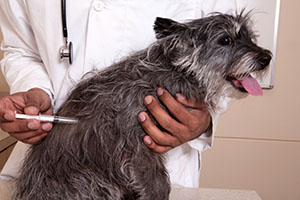By Dr. Zeoli, Associate Veterinarian

Vaccinating your pet means that you are protecting yourself, your family, neighbors, groomers, veterinary staff, postal worker, delivery person, and anyone else who comes in contact with your pet from life-threatening rabies.
I know what you may be wondering, why would I have to vaccinate my indoor pet against rabies? This is a common question that the doctors and support staff here at Pet Dominion are asked frequently. I completely understand where you are coming from because rabid raccoons typically do not break into homes…but they could. Setting that aside, there are many reasons why this vaccination is extremely important for both indoor and outdoor pets. Below are the 5 top reasons to vaccinate.
1. If your unvaccinated pet gets out and is bitten by an animal presumed to have rabies, Animal Control has the right to quarantine them with no contact to humans or animals for up to 6 months. If they deem it necessary, they can order the pet to be humanly euthanized for rabies testing. This test can only be performed postmortem because it requires samples of brain tissue. The costs to the owner would include the quarantine period.
2. If your unvaccinated pet bites a human or another animal they will need to be confined and observed for 10 days. If they show any signs of rabies, they must be euthanized and have rabies testing performed. Not to mention you can get sued and have legal fees in additions to this.
3. Rabies vaccination is required by law in the state of Maryland for all dogs and cats over 4 months old. Non-compliance could mean a hefty fine if reported.
4. A rabies infected animal could come into your home unwanted. Bats are the most common cause of rabies in the United States. They can get into the house through windows, screens, chimneys, etc. Because of the serious health threat, the health department takes any reports of bats in the home seriously.
5. An indoor pet could escape from home some time during their life. If they did, they could come in contact with a rabid animal (bat, raccoon, skunk, fox, feral cat, etc).
In a nutshell, rabies vaccination for pets is required by law, it’s expensive not to do it, and the consequences of not having your pet vaccinated are not worth the risk. Play it safe and schedule an appointment to have your pet vaccinated!
If you have any other questions about rabies transmission or the vaccine, feel free to give us a call at 301-258-0333. And be sure to give us a call today if your pet is overdue or coming due for his/her rabies vaccination.